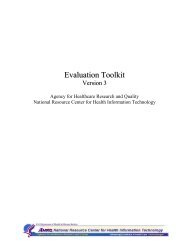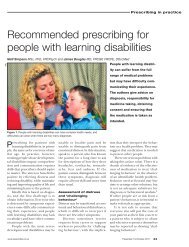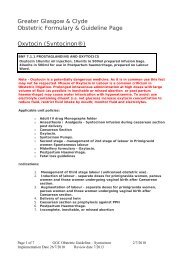The Fife Dementia Strategy: 2010 â 2020 - The Knowledge Network
The Fife Dementia Strategy: 2010 â 2020 - The Knowledge Network
The Fife Dementia Strategy: 2010 â 2020 - The Knowledge Network
You also want an ePaper? Increase the reach of your titles
YUMPU automatically turns print PDFs into web optimized ePapers that Google loves.
equire a range of ongoing and short-term health and social care services<br />
based on their individual needs. <strong>The</strong> variability in the services and support<br />
accessed in the journey travelled while living with dementia is a result of the<br />
individual needs as well as the historical context and a lack of central and<br />
strategic guidance which has allowed the development of service gaps and<br />
perceived inequalities throughout <strong>Fife</strong> (see 1.14-1.18).<br />
As the number of people with dementia in <strong>Fife</strong> continues to increase, services<br />
will be stretched even further, and without central leadership the links that<br />
remain may begin to pull apart. In order to improve equality and accessibility<br />
to diagnostic and ongoing support services, it is necessary that the service<br />
providers and users are involved in the developments which are led centrally.<br />
To ensure effective communication and information sharing a Lead for<br />
<strong>Dementia</strong> in <strong>Fife</strong> should be developed with a key role in improving service<br />
coordination and integration, and also in leading the implementation of this<br />
<strong>Strategy</strong>, working across health and social care services throughout <strong>Fife</strong>.<br />
Many of the relationships formed during the development of this <strong>Strategy</strong> as<br />
well as the recommendations and actions identified in this <strong>Strategy</strong> will<br />
contribute to improving partnership working and collaboration. <strong>The</strong> Lead for<br />
<strong>Dementia</strong> will continue to maintain these links while fostering new ones.<br />
3.2 Complete general and targeted awareness raising campaigns about<br />
dementia and the benefits of leading a healthy life.<br />
<strong>Dementia</strong> is a condition which concerns society as a whole, yet continues to<br />
be associated with stigma and ignorance. This often leads to people who have<br />
dementia and their families withdrawing from social contexts and delaying<br />
seeking help or support in an effort to protect themselves and their loved<br />
ones.<br />
<strong>The</strong>re also continues to be a general belief in the public and amongst many<br />
professionals that following a diagnosis of dementia little can be done for the<br />
person with dementia or their family. This is not the case. Advances in<br />
treatments, interventions and services available for people with dementia<br />
have been shown to have positive effects including delaying the progression<br />
of symptoms, improving quality of life, improving understanding of the<br />
condition and enabling future planning, and reducing rates of<br />
institutionalisation.<br />
By improving understanding about dementia, what it is, what can be done,<br />
and what benefits there are to receiving an early diagnosis, it is likely that<br />
more people will step up to acknowledge their condition and seek help.<br />
Awareness raising campaigns such as the initiative recently completed in<br />
Dundee using the Worried About Your Memory? material 10 offers advice on<br />
what affects memory, how to help memory, what to do if you think you might<br />
have dementia and where to get help. By targeting advertisements to services<br />
and locations commonly used by older people, such as on the bus, on<br />
10 NHS Health Scotland (2009). Worried about your memory? Edinburgh.<br />
20
















